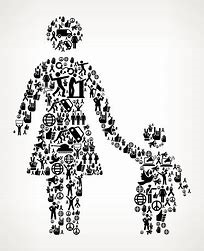Women and the Judicial System
- Filed under "public policy"
- Published Monday, May 1, 2023
- « back to articles

Over the last few months, Chrysalis staff has met with Chrysalis Community Partner grantees for the 2022 final reporting and, for those funded for 2023, planning for their work this year. It is our way of learning how the nonprofit agency is doing, what issues it is facing, what the girls and women they serve are experiencing, and what help Chrysalis can provide. As you know, this is our best opportunity to understand the current situation for many girls and women, and to provide additional support, including assisting with strategic planning, fund raising training, and helping connecting agencies dealing with similar issues.
Some agencies that Chrysalis partners with work with the judicial system and they report that they are often the only support a woman has when dealing with the court. It was frustrating to hear that often, the courts lean patriarchal, challenging a mother’s rights to protect her children.

Hearing this reminded me of a recent report I read (Women’s eNews, February 16, 2023) about a judge in Virginia who ordered a mother to stop nursing her 4-month-old infant to allow the father (who had abandoned the mother prior to the child’s birth) could have visitation rights 4 days a week at his home, and in the future, allowed overnight visits and weekends. Although the judge recommended the mother express her milk when she sent the baby for visits with the father, this option required the baby to alternate feedings between breast and bottle, something that is often difficult for infants.
Unfortunately, the Virginia case is not uncommon, notes author Phyllis Chesler in her book Mothers on Trial – The Battle for Children and Custody, who reported in her recently updated 1986 book that so often, the court’s attitudes and laws are prejudiced against mothers during custody battles. In fact, Chesler found, mothers are often slandered as being “morally dubious” if they have a relationship during a divorce, or mentally unbalanced if they are emotionally distraught about the loss of their children. Chesler accuses courts of orienting toward the father – even a violent father – so that his later petition for full custody will be granted. Devised by men’s rights groups, Chesler continues, this effort artificially creates a “primary caretaker” role for the father. In fact, an entire field of “specialists” representing fathers in custody cases has emerged.
According to Kirkus (a pre-publication book review magazine) in its review of Mothers on Trial, “While other sources could likely produce as many horror stories about judicial bias against fathers, Chesler’s facts cannot be denied: 37 percent of the men in her study kidnapped and brainwashed their children against the mother but were never punished; 70 percent of all the battles resulted in court-ordered paternal custody; 90 percent of all the fathers paid no alimony.”
Since the mid-1980s, women whose husbands sued them for custody lost at least 70% of the time, report those who study court cases. In fact, mothers are threatened with contempt of court if they attempt to enter convincing evidence of the father’s sexual abuse, according to Amy Neustein, PhD (co-author of From Madness to Mutiny, 2006). In her research, Dr. Neustein and attorney Michael Lesher uncovered how judges, private attorneys, child protective service caseworkers, and court-appointed mental health experts regularly create a “closed and claustrophobic” family court setting that feeds into a system that traps mothers in continued litigation, accusations of child abuse, and threats of contempt charges if they don’t withdraw their appeals.
This is not to say that in every situation that mothers are unfairly treated or that fathers experience special treatment, rather that this trend has emerged and can be specifically connected to long-standing biases unfairly support a narrative of “differing rules” for women vs men that has been absorbed into the family court system in the form of bias.
These gross violations of civil rights need to be addressed. If the courts continue to oppress mothers seeking justice in safely caring for their families, we need to raise our voices for greater oversight by judicial officials, informing our friends and peers of these unlawful practices, and continuing to assist agencies and advocates working to help women and their children who deserve better.
